- Home
- Conn Iggulden
The Death of Kings Page 7
The Death of Kings Read online
Page 7
He had thought of taking his life to deny them his ransom and the shame it would cause his family. If they could even raise the money.
It would have been easier on them if he had gone down with Accipiter like so many of his men. Instead, he was left to sit in his own filth with the twelve surviving officers and Cabera, who had escaped by offering to use his skills as a healer for the pirates. There were always those with wounds that would not close and infections that clung to their genitals after whores in lonely ports. The old man had been busy since the battle and was only allowed to see them once a day to check their own wounds and dressings.
Gaditicus shifted slightly, scratching at the lice and fleas that had infested him since the first night in the cramped and filthy cell. Somewhere above, the men that held them captive swaggered about on the trireme's decks, rich with prisoners for ransom and the chests of silver stolen from Accipiter's hold. It had been a profitable risk for them and he grimaced as he recalled their arrogance and triumph.
One of the men had spat in his face after his hands and feet were tied. Gaditicus flushed with anger as he thought of it. The man had been blind in one eye, his face a mass of old scars and stubbly bristle. The white eye had seemed to peer at the Roman captain, and the man's cackle almost made him show his anger and humiliate himself further by struggling. Instead, he had stared impassively, only grunting when the little man kicked him in the stomach and walked away.
“We should try to escape,” Suetonius whispered, leaning in close enough for Gaditicus to smell his breath.
“Caesar can't be moved at the moment, so put it out of your mind. It will take a few months for the ransom messages to reach the city and a few more for the money to come back to us, if it comes at all. We will have more than enough time to plan.”
Prax too had been spared by the pirates. Without his armor, he seemed much more ordinary. Even his belt had been taken in case the heavy buckle could be used as a weapon, and he constantly hitched up his bracae. Of all of them, he had taken the change in fortunes with the least obvious anger, his natural patience helping to keep them all steady.
“The lad's right though, Captain. There's a good chance they'll just drop us all overboard when they get the silver from Rome. Or, the Senate could stop our families making the payment, preferring to forget us.”
Gaditicus bristled. “You forget yourself, Prax. The senators are Romans as well, for all your poor opinions of them. They won't let us be forgotten.”
Prax shrugged. “Still, we should make plans. If this trireme meets another Roman galley, we'll be sent over the side if they look like boarding us. A bit of chain around our feet would do the job nicely.”
Gaditicus met the eyes of his optio for a few moments. “All right. We'll work out a few things, but if the chance comes, I'm not leaving anyone behind. Caesar has a broken arm as well as the head injury. It will be weeks before he can stand, even.”
“If he survives,” Suetonius put in.
Cabera looked at the young officer, his gaze sharp. “He is strong, this one, and he has an expert healer tending him.”
Suetonius looked away from the old man's intense stare, suddenly embarrassed.
Gaditicus broke the silence. “Well, we have the time to consider all outcomes, gentlemen. We have plenty of that.”
CHAPTER 6
Casaverius allowed himself a smile of self-congratulation as he surveyed the long kitchen hall. Everywhere, the bustle of the evening was coming to an end, with the last of the orders served hours before.
“Perfection is in the detail,” he murmured to himself, as he had done every evening for the ten years he had been employed by Cornelius Sulla. Good years, though his once trim figure had swollen alarmingly in the time. Casaverius leaned back against the smooth plaster wall and continued grinding with his pestle and mortar, preparing a mustard seed paste that Sulla loved. He dipped a finger into the dark mixture and added a little oil and vinegar from the row of narrow-necked pots that hung along the walls. How could a good cook resist tasting his own meals? It was part of the process. His father had been even larger, and Casaverius took pride in his heaviness, knowing that only a fool would employ a thin cook.
The brick ovens had been closed to the air for long enough and should have cooled. Casa motioned to the slaves that they could be raked clean, ready for new charcoal in the morning. The air in the kitchen was still thickly sluggish with heat, and he pulled a rag from his belt to wipe his brow. With the weight, he seemed to sweat more, he admitted to himself, pressing the already damp cloth against his face.
He considered finishing the paste in one of the cool rooms where iced dishes were prepared, but hated to leave the slaves unattended. He knew they stole food for their families, and in moderation he could forgive them. Left alone, though, they might grow incautious, and who knew what would disappear then? He remembered his father complaining about the same thing in the evenings and quickly whispered a prayer for the old man, wherever he was now.
There was a great peace at the end of a day that had gone well. Sulla's house was known for fine food, and when the call came for something special, he enjoyed the excitement and energy that stole over the staff, starting with the moment of anticipation as he opened his father's sheaf of recipes, untying the leather thongs that bound the valuable parchments and running his finger down the lettering, taking pleasure from the fact that only he could read them. His father had said that every cook should be an educated man, and Casaverius sighed for a moment, his thoughts turning to his own son. The lad spent mornings in the kitchens, but his studies seemed to fly from his mind whenever the day was fine. The boy was a disappointment and Casaverius had come to accept that he might never be able to run a grand kitchen on his own.
Still, there were years left before he would leave his plates and ovens for the last time, retiring to his small home in a good district of the city. Perhaps then he might find time to entertain the guests his wife wanted. Somehow, he never managed to bring his expertise into his own home, being satisfied with simple dishes of meat and vegetables. His stomach grumbled a little at the thought, and he saw the slaves were removing their own roasted packages of bread and meat from the ashes of the ovens, where they had been placed at the end. It was a small loss to the kitchen to be able to send them back to their quarters with a few hot mouthfuls, and it made a friendly atmosphere in the kitchens, he was sure.
The new slave, Dalcius, passed him, bearing a metal tray of spice pots, ready to be placed back on their shelves. Casaverius smiled to him as he began unloading the tray.
He was a good worker and the broker at the sales had not lied when he said he knew his way round a kitchen. Casaverius considered that he might allow him to prepare a dish for the next banquet, under his watchful eye.
“Make sure the spices go in the right places, Dalcius,” he said.
The big man nodded, smiling. He certainly wasn't a talker. That beard might have to be cut off, he thought. Casaverius's father had never let a beard into his kitchens, saying they made the place look untidy.
He tasted his mustard paste again and smacked his lips appreciatively, noting that Dalcius finished his task quickly and neatly. From his scars, he looked more like an old fighter, but there was nothing bullish about the man. If there had been, Casaverius couldn't have had him in the kitchens, where the endless rushing and carrying always meant a few would bump into each other. Bad tempers couldn't survive down below the rich houses, but Dalcius had proved amiable, if silent.
“I will need someone to help me tomorrow morning, to prepare the pastries. Would you like to do that?” Casaverius didn't realize he was speaking slowly, as if to a child, but Dalcius never seemed to mind and his silences invited the manner. There was no malice in the fat cook, and Casaverius was genuinely pleased when Dalcius nodded to him before going back into the stores. A cook had to have an eye for good workers, his father had always said. It was the difference between working yourself into an early grave and ac
hieving perfection.
“And perfection is in the detail,” he murmured again to himself.
At the end of the long kitchen hall, the door to the house above opened and a smartly dressed slave entered. Casaverius straightened, laying his mortar and pestle aside without thought.
“The master sends his apologies for the late hour and wonders if he may be sent something cold before he sleeps, an ice dish,” the young man said, bowing.
Casaverius thanked him, pleased as always with the courtesy.
“For all his guests?” he asked quickly, thinking.
“No, sir, his guests have departed. Only the general remains.”
“Wait here, then. I will have it ready in a few moments.”
The kitchens went from end-of-evening stupor to alertness in the time it took Casaverius to issue new orders. Two of the kitchen runners were sent down the steps to the ice rooms, far below the kitchens. Casa strode under a low arch and through a short corridor to where the desserts were prepared.
“A lemon ice, I think,” he muttered as he walked. “Beautiful bitter southern lemons, made sweet and cold.”
Everything was in place as he entered the cool dessert room. Like the main kitchen, the walls were hung with dozens of amphorae filled with syrups and sauces, made and refilled whenever the kitchens were quiet. There was no hint of the oven heat in there, and he felt the sweat chill on his heavy body with a pleasurable shiver.
The ice blocks, wrapped in rough cloth, were brought up in minutes and crushed under his direction until the ice was a fine slurry. To this he added the bittersweet lemon and stirred it in, just enough to flavor without overpowering. His father had said the ice must not be yellow, and Casaverius smiled as he noted the color and fine texture, using a ladle to scoop the mixture into the glass bowls on a serving tray.
He worked quickly. Even in the cool room the ice was melting, and the journey through the kitchens would have to be fast. He hoped that one day Sulla would allow another passage to be cut in the rock under his luxurious home, so that the iced desserts could be brought straight up. Still, with care and speed, the dishes would reach his table almost intact.
After only a few minutes, the two bowls were full of the white ice and Casaverius sucked his fingers, groaning in exaggerated pleasure. How good it was to taste cold in the summer! He wondered briefly how much silver coin the two bowls represented, but it was an unimaginable sum. Drivers and carts transported huge blocks from the mountains, losing half in the journey. They were brought down to the dripping darkness of the ice rooms below him, there to melt slowly, but giving cool drinks and desserts for all the summer months. He reminded himself to check that supplies were adequate. It was almost time for a new order.
Dalcius entered the room behind him, still carrying his spice tray.
“May I watch you prepare the ices? My last master never had them.”
Casaverius motioned him in, cheerfully. “The work is done. They must be rushed through the kitchens before they begin to melt.”
Dalcius leaned over the table and his arm knocked over the jug of sticky syrup, which spread in a wide yellow stain. Casaverius's good humor vanished on the instant.
“Quick, you idiot, fetch cloths to clean it up. There is no time to waste.”
The big slave looked terrified and he stammered, “I—I'm sorry. I have another tray here, master.”
He held out the tray and Casaverius lifted the bowls, cleaning them quickly with his own sweat-soaked rag. No time to be sensitive, he thought. The ice was melting. He placed the bowls on the tray and wiped his fingers irritably.
“Don't just stand there, run! And if you trip over your own feet, I'll have you whipped.” Dalcius moved quickly out of the room, and Casaverius began to wipe up the spilled mess. Perhaps the man was too clumsy for more difficult tasks.
Outside in the corridor, it was the work of a moment for Tubruk to empty the vial of poison into the bowls, stirring it in with a finger. That done, he raced through to the kitchen and handed the tray to the waiting slave.
The eyes that had seemed so nervous looked steadily at the retreating back as the door to the house above closed behind him. Now he must escape, but there was bloody work to do first. He sighed. Casaverius was not a bad man, but one day in the future, with the beard cut off and his hair grown back to its normal length, the cook might still be able to recognize him.
Feeling suddenly weary, he turned back toward the cool rooms, touching the bone-handled knife under his tunic as he walked. He would make sure it looked like a murder rather than suicide. That should keep Casaverius's family safe from revenge.
“Did you give him the tray?” Casa snapped as Tubruk reentered the small cool room.
“I did. I am sorry, Casaverius.”
The cook looked up as Tubruk stepped quickly toward him. The man's voice had deepened slightly and the usual manner was missing. Casaverius saw the blade, and fear and confusion coursed through him.
“Dalcius! Put that down!” he said, but Tubruk shoved the dagger neatly into the fleshy chest, bursting the heart. Twice more he stabbed it home to be sure.
Casaverius fought for breath, but it would not come. His face purpled and his hands flailed, knocking the ladles and jugs off the tables with a crash.
Finally, Tubruk stood, feeling sick. In all his years as a gladiator and a legionary, he had never murdered an innocent and he felt stained by it. Casaverius had been a likeable man and Tubruk knew the gods cried out against those that hurt the good. He steadied himself, trying to drag his gaze away from the fat man's body where it had slid onto the floor. He left quietly, his footsteps loud in the corridor that led back to the kitchen. Now he had to escape and reach Fercus before the alarm was sounded.
* * *
Sulla lolled on a couch, his thoughts drifting away from the conversation with his general, Antonidus. It had been a long day and the Senate seemed to be trying to block his nominations for new magistrates. He had been made Dictator with the mandate of restoring order to the Republic, and they had been eager enough to grant his every wish for the first few months. Recently, they had taken up hours of debate with long speeches on the powers and limitations of the office, and his advisers had said he should not impose on them too harshly for a while. They were small men, he thought. Small in deed and dreams. Marius would scorn them for fools, if he were still alive.
“. . . objections will be raised to the lictors, my friend,” Antonidus was saying. Sulla snorted disdainfully.
“Objections or not, I will continue to have twenty-four of them with me. I have many enemies and I want them to be a reminder of my power as I walk between Capitoline hill and the Curia.”
Antonidus shrugged. “In the past, there have been only twelve. Perhaps it is better to let the Senate have their way on this, to gain strength in more serious negotiation.”
“They are a pack of toothless old men!” Sulla snapped. “Has not order returned to Rome in the last year? Could they have done it? No. Where was the Senate when I was fighting for my life? What help were they to me then? No. I am their master and they should be made to recognize that simple fact. I am tired of walking carefully around their sensibilities and pretending the Republic is still young and strong.”
Antonidus said nothing, knowing that any objection he made would be met with wilder promises and threats. He had been honored at first to be taken on as military adviser, but the post had been a hollow one, with Sulla using him only as a puppet for his own orders. Even so, part of him agreed with Sulla's frustration. The Senate struggled to protect their dignity and old authority, while acknowledging the need for a Dictator to keep the peace in the city and Roman lands. It was farcical and Sulla was quickly tiring of the game.
A slave entered with the ices, placing them on a low table before bowing out of the room. Sulla sat up, his irritation forgotten for a moment.
“You will have to taste these. There is nothing like them for relief from the summer heat.” He took a s
ilver spoon and ladled the white ice into his mouth, shutting his eyes for a moment with pleasure. It was soon empty, and he considered calling for another bowl. His whole body seemed cooler after the ice, and his mind was calm. He saw Antonidus had not begun and urged him on.
“It must be eaten quickly, before it melts. Even then, it can be a wonderfully refreshing drink.” He watched as the general sampled a spoonful and smiled with him.
Antonidus wanted to finish their business and go home to his family, but knew he could not rise until Sulla became tired. He wondered when that might be.
“Your new magistrates will be confirmed tomorrow at the Curia,” he said.
Sulla lay back on his couch, his expression resuming its sulky lines. “They had better be. I owe those men favors. If there is another delay, the Senate will regret it, I swear before the gods. I will disband them and have the doors nailed shut!”
He winced slightly as he spoke and his hand drifted to his stomach, rubbing gently for a moment.
“If you choose to disband the Senate, there will be civil war again, with the city in flames once more,” Antonidus said. “However, I suspect you would emerge triumphant at the end. You know you have unwavering support in the legions.”
“That is the path of kings,” Sulla replied. “It draws and repels me at the same time. I loved the Republic, would still love it now if it were run by the sort of men who ruled when I was a boy. They are all gone now, and when Rome calls, the little ones who are left can only run crying to me.” He belched suddenly, wincing, and as he did so Antonidus felt a worm of pain begin in his own gut. A sudden fear brought him to his feet, his glance falling to the bowls, one empty, one barely touched.
“What is it?” Sulla demanded, pulling himself upright, his face twisting in the knowledge even as he spoke. The burning in his belly was spreading and he pressed his hand into himself as if to crush it.

 The Khan Series 5-Book Bundle
The Khan Series 5-Book Bundle Tollins 2: Dynamite Tales
Tollins 2: Dynamite Tales Tollins: Explosive Tales for Children
Tollins: Explosive Tales for Children The Field of Swords
The Field of Swords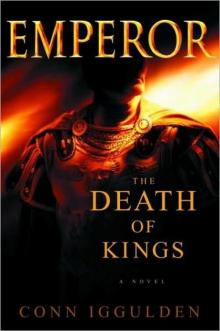 The Death of Kings
The Death of Kings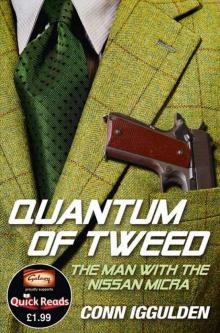 Quantum of Tweed: The Man With the Nissan Micra
Quantum of Tweed: The Man With the Nissan Micra Bones of the Hills
Bones of the Hills Genghis: Birth of an Empire
Genghis: Birth of an Empire The Gates of Rome
The Gates of Rome Dunstan
Dunstan Fig Tree
Fig Tree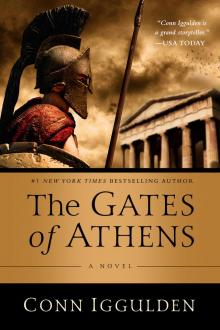 The Gates of Athens
The Gates of Athens Stormbird
Stormbird Khan: Empire of Silver
Khan: Empire of Silver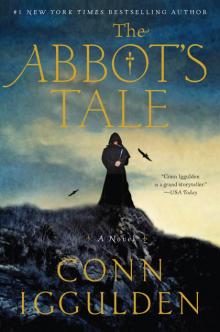 The Abbot's Tale
The Abbot's Tale Gengis: Lords of the Bow
Gengis: Lords of the Bow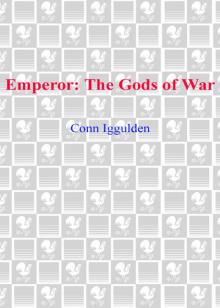 The Gods of War
The Gods of War Blackwater
Blackwater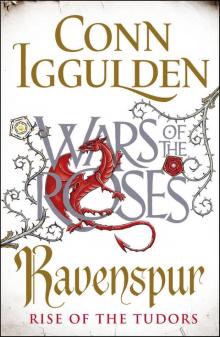 Ravenspur: Rise of the Tudors
Ravenspur: Rise of the Tudors Wars of the Roses: Trinity (War of the Roses Book 2)
Wars of the Roses: Trinity (War of the Roses Book 2) The Gods of war e-4
The Gods of war e-4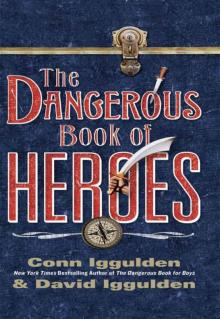 The Dangerous Book of Heroes
The Dangerous Book of Heroes Stormbird wotr-1
Stormbird wotr-1 Emperor: The Death of Kings
Emperor: The Death of Kings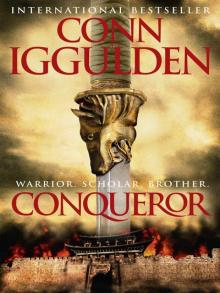 Conqueror (2011) c-5
Conqueror (2011) c-5 The Dangerous Book for Boys
The Dangerous Book for Boys Genghis Lords of the Bow
Genghis Lords of the Bow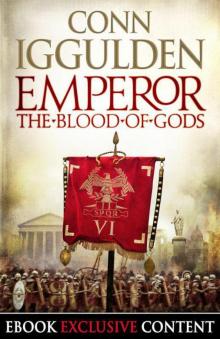 Emperor: The Blood of Gods (Special Edition) (Emperor Series, Book 5)
Emperor: The Blood of Gods (Special Edition) (Emperor Series, Book 5) The Emperor Series: Books 1-5
The Emperor Series: Books 1-5 Lords of the Bow c-2
Lords of the Bow c-2 Lords of the Bow
Lords of the Bow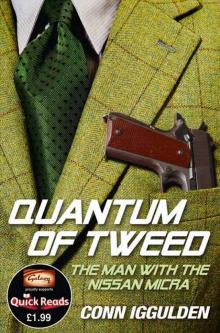 Quantum of Tweed
Quantum of Tweed Wars of the Roses 01 - Stormbird
Wars of the Roses 01 - Stormbird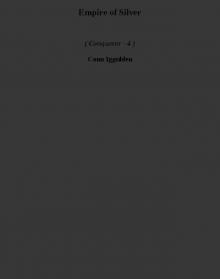 Empire of Silver c-4
Empire of Silver c-4 Birth of an Empire
Birth of an Empire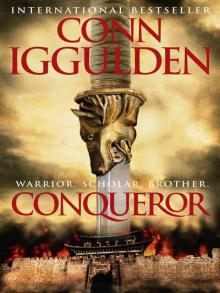 Conqueror (2011)
Conqueror (2011) Wars of the Roses: Bloodline: Book 3 (The Wars of the Roses)
Wars of the Roses: Bloodline: Book 3 (The Wars of the Roses) Bones Of the Hills c-3
Bones Of the Hills c-3 Empire of Silver
Empire of Silver The Khan Series 5-Book Bundle: Genghis: Birth of an Empire, Genghis: Bones of the Hills, Genghis: Lords of the Bow, Khan: Empire of Silver, Conqueror
The Khan Series 5-Book Bundle: Genghis: Birth of an Empire, Genghis: Bones of the Hills, Genghis: Lords of the Bow, Khan: Empire of Silver, Conqueror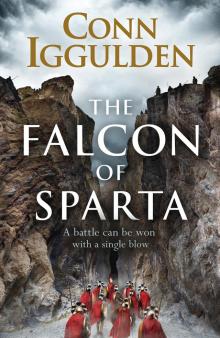 The Falcon of Sparta
The Falcon of Sparta Explosive Tales for Children
Explosive Tales for Children